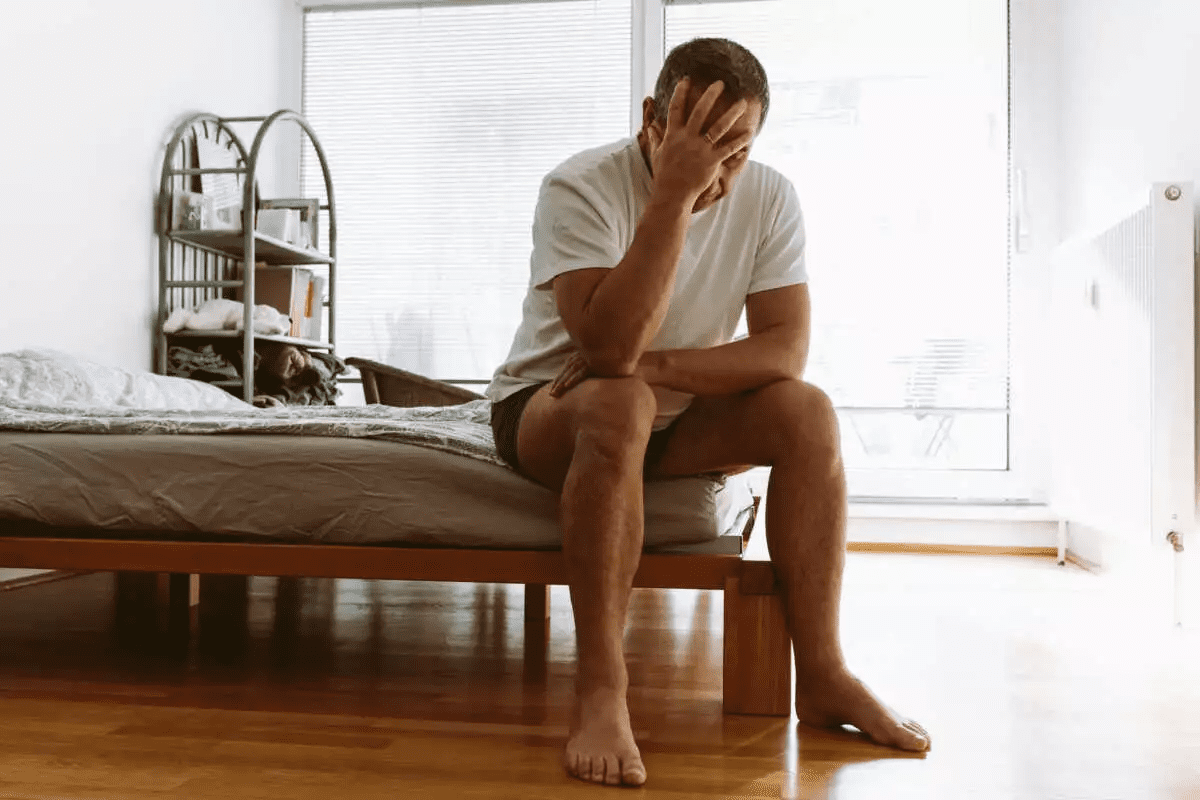Last Updated on October 31, 2025 by Bilal Hasdemir

Erectile dysfunction (ED) is a common issue for many men around the world. It makes it hard to get or keep an erection. Medical Expert, a urologist at Medical organization, says ED is when you have trouble with erections.Can stress cause ED (erectile dysfunction)? Learn how psychological and physical stress impacts blood flow and sexual performance.
Stress and anxiety play a big role in ED. Studies show that stress can make ED worse by affecting both the body and mind.
At Liv Hospital, we know stress can cause ED, but it’s something we can handle. We offer care that focuses on the patient, using proven treatments and kindness. This helps men feel better about themselves again.
By understanding how stress and ED are linked, men can get the help they need. This is the first step towards feeling better.

Stress and sexual health are closely linked. Psychological factors greatly affect physical function. The link between stress and sexual issues is complex, involving both emotional and physical responses.
“When you are not sure of the exact cause of your stress, it may help to know the warning signs of stress.” Common causes of stress include big life events like the death of a loved one, confrontations, marriage, deadlines, legal problems, job loss, divorce, new job, retirement, money problems, illnesses, and parenting challenges. These stressors can deeply affect an individual’s sexual well-being.
Psychological stress can greatly affect physical sexual function. When stressed, the body’s “fight or flight” response is triggered. This releases stress hormones like cortisol and adrenaline. These hormones can disrupt the sexual response cycle, leading to issues like erectile dysfunction.
Key psychological factors that impact physical function include anxiety, depression, and performance anxiety. These factors can create a vicious cycle where the fear of sexual failure worsens the problem. This makes it harder to achieve or maintain an erection.
Studies show that stress-related sexual issues are more common than thought. For example, research finds that anxiety disorders are in 20.0% to 41.2% of patients with erectile dysfunction (ED). This shows the big role psychological stress plays in sexual health.
The high number of stress-related sexual issues shows we need a full approach to treat erectile dysfunction. We must address both the physical and psychological sides of the condition.
“The mind-body connection is critical in understanding and treating sexual dysfunction. By acknowledging the impact of stress on sexual health, we can develop more effective treatment strategies.”
Understanding the link between stress and sexual health helps us tackle erectile dysfunction’s root causes. This improves overall well-being.

Erectile dysfunction and stress are closely linked, with research showing their complex relationship. It’s clear that stress can lead to or worsen ED.
Many studies have looked into the connection between stress and ED. They’ve found that stress, including depression and anxiety, makes ED worse in people with chronic conditions like diabetes.
For example, 61.4% of patients with diabetes mellitus experience ED. This shows how physical health, mental health, and sexual function are all connected.
Anxiety is common in ED patients, with studies showing 20% to 41% have anxiety disorders. This highlights the psychological side of ED and the need for a full treatment plan.
Research strongly supports the link between stress and ED. By looking at the data, we can understand how stress affects erectile function.
Study | Prevalence of ED | Prevalence of Anxiety |
Diabetes Mellitus Study | 61.4% | Not Specified |
ED Patient Survey | 100% | 20-41% |
This table shows important findings from studies. It highlights the high rates of ED and anxiety in different groups.
Stress sets off a chain of reactions in our body. It can make it hard to get or keep an erection. This happens because our body goes into “fight or flight” mode.
Stress also messes with our hormones. It can change the levels of hormones we need for sex, like testosterone. High levels of cortisol, a stress hormone, can lower testosterone.
Stress can upset the balance of hormones in our body. This affects our sex drive and ability to get an erection. Low testosterone can make it hard to feel like having sex and to get an erection.
Hormone | Role in Erectile Function | Effect of Chronic Stress |
Testosterone | Regulates libido and erectile function | Decreased production |
Cortisol | Stress hormone | Elevated levels |
The nervous system is key for getting an erection. Stress can mess with this system. The sympathetic nervous system can take blood away from the sexual organs.
Stress can make it hard to get an erection. It affects the nervous system and blood flow. This shows how stress, the nervous system, and erections are connected.
It’s important to understand how stress affects our body. Knowing how stress changes hormones and the nervous system helps us find ways to treat erectile dysfunction.
It’s important to know the difference between acute and chronic stress to understand how it affects erectile dysfunction. Stress can take many forms, and its impact on sex health changes based on its length and strength.
Acute stress, caused by big life events or immediate problems, can lead to temporary erectile dysfunction (ED). This stress is usually short and goes away once the problem is solved. For example, a man facing acute stress from a big life change might have trouble getting or keeping an erection. But, this problem usually goes away on its own.
Chronic stress, on the other hand, has deeper and longer-lasting effects on sex. It can cause hormonal imbalances, like higher cortisol levels, which mess with the body’s normal functions, including sex. If not handled, chronic stress can cause long-term erectile dysfunction.
The long-term effects of chronic stress on sex health include:
It’s key to understand stress patterns and their impact on sex health to manage them well. Knowing if stress is acute or chronic helps in finding the right ways to lessen its impact on erections.
Stress Type | Duration | Impact on Sexual Health |
Acute Stress | Short-term | Temporary ED, reversible |
Chronic Stress | Long-term | Persistent ED, hormonal imbalances |
By knowing the difference between acute and chronic stress, people can better handle their stress and reduce its impact on their sex life.
Performance anxiety plays a big role in erectile dysfunction, making a tough cycle to get out of. When men first have trouble with erections, it makes them worry more about their sex life. This worry makes the problem worse.
First-time trouble with erections can be scary, making men worry it will happen again. This worry is called anticipatory anxiety. It’s when someone gets anxious about possibly having trouble with erections again.
This anxiety can really hold someone back, making it seem like it’s true. We see that:
Anticipatory anxiety is a big part of the cycle of performance anxiety. It’s a constant fear of not being able to have sex, often because of past trouble with erections.
This anxiety can make people avoid sex because they’re scared of not doing well. But avoiding sex can make the anxiety even worse, making it harder to get over.
To stop the cycle of performance anxiety and erectile dysfunction, we need to tackle it from many angles. Here’s what we suggest:
By focusing on the mental side of erectile dysfunction, people can start to break the cycle. This can help improve their sex life overall.
Stress disorders like PTSD and generalized anxiety disorder can cause erectile dysfunction. We will look into how these conditions affect sexual health.
PTSD can greatly affect sexual function. Trauma can lead to anxiety and depression, making erectile dysfunction worse.
Generalized Anxiety Disorder (GAD) causes constant worry and anxiety. This can make it hard to get sexually aroused and maintain an erection.
Depression affects both mental and physical health, including erectile function. The relationship between depression and erectile dysfunction is complex.
Long-term work stress can cause burnout, harming overall health and sexual well-being. High levels of stress hormones can mess with our body’s normal functions.
Stress Disorder | Impact on Erectile Function |
PTSD | Anxiety and depression exacerbate ED |
Generalized Anxiety Disorder | Interferes with sexual arousal and erectile function |
Depression | Dual impact on mental and physical health, contributing to ED |
Work-Related Stress | Leads to burnout, disrupting normal physiological processes |
It’s important to understand how specific stress disorders affect erectile function. By treating these conditions, people can improve their sexual health.
Diagnosing stress-induced erectile dysfunction is a detailed process. It’s key to find the root cause of ED and create a good treatment plan.
First, a detailed medical history is reviewed. This includes when and how long ED has lasted. It helps spot risk factors and underlying conditions.
Laboratory tests are also vital. They check for hormone imbalances that might affect erections. Other tests look for diseases like diabetes or heart problems.
It’s important to tell if ED is caused by physical or psychological factors. Stress and mental health often play big roles. A full evaluation looks at both to find the main cause.
Psychological tests might include questionnaires or interviews. They check the patient’s mental state, stress, and overall well-being. This helps understand how stress affects erections.
If you have ongoing or frequent ED, get professional help. A doctor can do a full check-up and suggest the best treatment.
Early treatment can make a big difference. By tackling the causes of ED, whether physical, mental, or both, you can improve your sexual health and overall well-being.
Stress-related erectile dysfunction can be managed in several ways. This includes psychological support, medical therapy, and lifestyle changes. Experts say that coping is a journey, not a single event. A detailed treatment plan is key to effectively addressing this condition.
Psychological support is vital in managing stress-related ED. Cognitive-behavioral therapy (CBT) and relaxation exercises are helpful. They help individuals manage stress and anxiety, which are major causes of ED.
Medical treatments can also help manage stress-related ED. These include:
Treatment | Description |
Oral Medications | Phosphodiesterase type 5 inhibitors (PDE5 inhibitors) to improve erectile function |
Hormone Therapy | Treatment for hormonal imbalances that may contribute to ED |
Lifestyle changes are also important in managing stress-related ED. These include:
By using these treatment approaches, individuals can manage stress-related ED better. This improves their overall sexual health.
It’s key to understand how stress affects erectile dysfunction for better sexual health. We’ve seen how stress can make it hard to get or keep an erection.
Managing stress is vital to lessen its impact. Lowering expectations and accepting things we can’t change help a lot. Also, solving problems can make us feel better.
By using these methods and getting help when needed, we can reduce stress’s bad effects on sex. Stress management boosts our overall health and sex life, making life better.
We stress the need for a full approach to stress management. This includes changing our lifestyle and using psychological help. It’s the best way to improve our sexual health and overall well-being.
Yes, stress can lead to erectile dysfunction. Stress triggers our “fight or flight” response. This releases hormones like cortisol and adrenaline. These hormones can mess with our nervous system and blood flow, making it hard to get or keep an erection.
Stress can harm erectile function in many ways. It can mess with our hormones, affect our nervous system, and cause blood flow issues. Long-term stress can also make us tired, lower our libido, and increase anxiety, all of which can lead to erectile dysfunction.
Sometimes, stress-induced erectile dysfunction is temporary. If we deal with the stress, our erectile function might get better. But if the stress keeps going or isn’t handled well, it can cause long-term erectile dysfunction.
Yes, anxiety can cause erectile dysfunction. Anxiety can make us anxious about performing, which can make it hard to get or keep an erection. It can also cause physical symptoms like a fast heartbeat, sweating, and tremors, which can make erectile dysfunction worse.
To diagnose stress-related erectile dysfunction, a doctor will do a physical exam, ask about your medical history, and run some tests. They might also ask about your stress levels, anxiety, and other psychological factors to see if stress is a factor.
Treatment for stress-related erectile dysfunction can include counseling or therapy, medical treatments like medications or hormone therapy, and making lifestyle changes. This can include managing stress, exercising regularly, and eating a healthy diet.
Yes, making lifestyle changes can help with stress-related erectile dysfunction. Activities like meditation, yoga, and deep breathing can help manage stress. Regular exercise and a healthy diet can also improve your overall health and well-being.
If you have persistent or recurring erectile dysfunction, it’s a good idea to see a doctor. A healthcare professional can figure out the cause and suggest the best treatment options.
Yes, managing stress can help prevent erectile dysfunction. By keeping stress under control, you can lower your risk of erectile dysfunction and improve your overall health and well-being.
Yes, it’s possible to overcome stress-induced erectile dysfunction. With the right approach, including stress management, lifestyle changes, and medical treatments if needed, you can improve your erectile function and overall sexual health.
Subscribe to our e-newsletter to stay informed about the latest innovations in the world of health and exclusive offers!
WhatsApp us